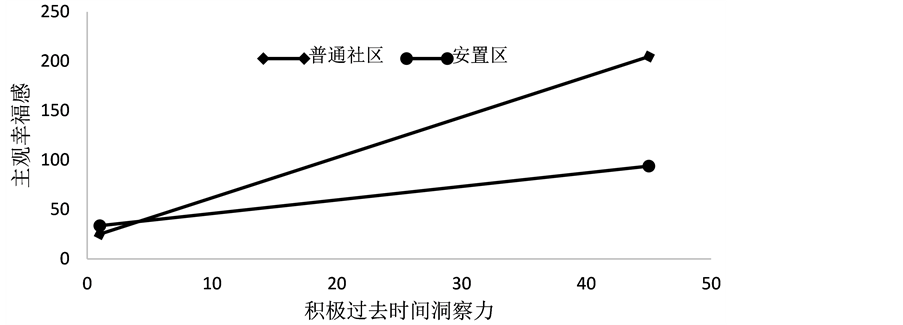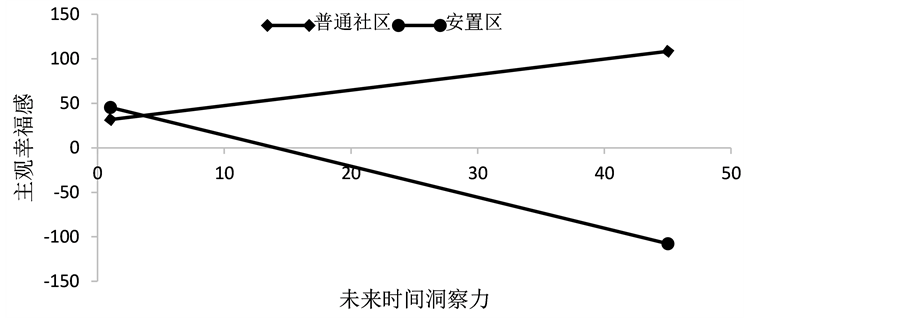1. 前言
随着社会的发展,离退休人口的数量增加,老年人在我国社会人口中所占的比例逐渐增大。同时,由于我国城市化进程的不断加快,城市规模和城市空间迅速扩张,大量农用或集体土地被征用,这导致大量失地农民主动或被动迁移到安置区这一新生社区中,其中老年人也占很大比例。他们由于各方面的原因,并不能很好地适应新的生活环境和生活状态,因此加强对安置区老年人的生活状况和心理健康的研究很有必要。但是长期以来,对于失地农民安置区的研究相对缺乏,集中表现在缺乏“以人为本”的研究,即缺乏对他们的生存状态和心理状况的研究。主观幸福感是公认的衡量个体生活质量和心理健康的重要指标,因此本研究对普通社区和安置区老年人的主观幸福感等分别进行了调查,期望为提升他们的主观幸福感水平提供有效的建议。
主观幸福感(Subjective well-being, SWB)是个体根据自己独特的标准对其生活质量的整体性主观评价,它包含认知评估和情绪体验两个方面。认知评估主要是指生活满意度,即个体对自己总体的生活质量以及具体生活领域(比如家庭、友情或居住环境等)满意程度的评估;情绪体验包括积极情绪体验和消极情绪体验,两种情绪维度是相互独立的(Diener, Suh, Lucas, & Smith, 1999)。主观幸福感不仅可以评估一个人的生活质量,还能衡量其心理健康状况和心理发展水平(李金珍,王文忠,施建农,2003)。
影响老年人主观幸福感的主观因素中,时间洞察力(Time Perspective)作为个体对于时间的认知、体验和行动(或行动倾向)的一种人格特质(黄希庭,2004),其对老年人主观幸福感的影响已被很多研究证实。Zimbardo和Boyd (1999)把时间洞察力分为了五种,即消极过去时间洞察力(Past-Negative TP),分数越高,个体对于过去越是消极反感;积极过去时间洞察力(Past-Positive TP),分数越高的个体越能积极地看待自己的过去;享乐主义现在时间洞察力(Present-Hedonistic TP),分数越高的个体越关注于现在的及时行乐,而较少考虑这些享乐可能带来的后果;宿命主义现在时间洞察力(Present-Fatalistic TP),分数越高的个体越认为自己不能改变自己的生活,一切都是命中注定;未来时间洞察力(Future TP),分数越高的个体越能关注于未来目标,为自己目标的实现所做的准备就越充足。
Kazakina (1999)调查了169名65岁以上的老年人的时间洞察力水平和主观幸福感,发现积极过去时间洞察力的水平越高,老年人的主观幸福感越高。也有研究表明积极地看待过去可以缓解老年人的焦虑和抑郁状态,提升他们的积极情感,进而增强他们的主观幸福感(Serrano, Latorre, Gatz & Montanes, 2004; Westerhof, Bohlmeijer & Webster, 2010)。对于现在时间洞察力,Maslow (1971)认为个体积极地关注现在对于他们的心理健康和幸福感具有重要意义。Drake等(2008)研究发现个体的享乐主义现在时间洞察力得分越高,其主观幸福感水平就越高;也有研究发现宿命主义现在时间洞察力得分越高的个体,其主观幸福感水平越低(Boniwell, 2005; Zimbardo, 2002)。Desmyter和De Raedt (2012)调查了149名65~96岁的老年人的时间洞察力和主观幸福感,发现未来时间时间洞察力和享乐主义现在时间洞察力水平越高的老年人有着更多的积极情绪体验;积极过去时间洞察力越高的老年人有着更高的生活满意度;消极过去时间洞察力越高的老年人有更多的消极情绪体验、更低的积极情绪体验和生活满意度;宿命主义现在时间洞察力则与抑郁显著相关。社会情绪选择理论(Socioemotional Selectivity Theory)认为个体有“知识获得”和“情绪管理”两大社会目标,个体对于时间的感知能够影响其对社会目标的选择,进而影响个体的行为和情感(Carstensen, Isaacowitz, & Charles, 1999)。年轻人由于知觉到未来时间比较充裕,因此他们更多的选择“知识获得”相关的目标,通过“知识获得”目标的满足来提升主观幸福感,而老年人由于知觉到生命中剩余时间有限,因此会优先选择“情绪管理目标”,通过缩小社会关系网络来提升自身主观幸福感(敖玲敏,吕厚超,黄希庭,2011)。
综上,时间洞察力对老年人的主观幸福感的影响已经被很多研究证实。但是对于不同居住地的老年人来说,时间洞察力对他们主观幸福感的影响可能不尽相同。首先是过去生活状况的不同,安置区老年人失地以前躬耕为生,而普通社区老年人退休前大都是工薪阶层,他们之间的生活环境的差异可能会影响他们的时间洞察力水平,进而影响主观幸福感。其次是收入和养老保障的差异,安置区老年人失地以前有稳定的土地收入,失地以后则没有,而普通社区老年人则有稳定的退休收入,他们的养老保障水平也有差异。有研究表明,收入和养老保障对老年人主观幸福感有显著影响(曲海英,2015;王枫,王茜,庄红平,况成云,2010)。不同居住地的老年人之间还有社会支持的差异,安置区居住环境的改变,使得老年人之间的联系不如以往那样密切(曲海英,2015),以往熟悉的同伴也可能由于搬迁而失散;而普通社区老年人则有较为稳定的交友圈子,他们获得的社会支持水平也相对较高。总的来说,由于不同居住地的老年人的生活环境等存在明显的差异,因此居住地有可能在时间洞察力与老年人主观幸福感之间存在调节效应。我们对普通社区和安置区的老年人进行了问卷调查,探究时间洞察力与老年人主观幸福感的关系,以及居住地在二者关系中是否有调节作用。
2. 方法
2.1. 对象
对重庆某普通社区与某安置区各220位老年人进行问卷调查,共发放问卷440份,得到有效问卷411份,有效回收率93.41%,其中普通社区回收有效问卷207份,安置区有效问卷204份。男性168名(普通社区89人,安置区79人),占总人数的40.88%;女性243名(普通社区118人,安置区125人),占总人数的59.12%。年龄在60~94岁之间,平均年龄为71岁。其中60~70岁占60.58%,71~80岁占29.93%,81~94岁占9.49%。
2.2. 工具
津巴多时间洞察力量表(Zimbardo Time Perspective Inventory, ZTPI),Zimbardo和Boyd (1997)编订。量表由56个条目组成,如“我做事习惯列出清单”。其中五种时间洞察力中消极过去时间洞察力10个条目,积极过去时间洞察力9个条目,享乐主义现在时间洞察力15个条目,宿命主义现在时间洞察力9个条目,未来时间洞察力13个条目。每个项目采用5点评分法,选项由“完全不符合”到“完全符合”,代表分值1到5。各个子量表的Crobach’s α系数分别为0.82、0.80、0.79、0.74、0.77。我们对每个子量表分别计分,分数越高,个体的该种时间洞察力水平越高。
纽芬兰纪念大学主观幸福感量表(Memorial University of Newfoundland Scale of Happiness, MUNSH),Kozma和Stones (1980)编订。MUNSH由24个条目组成,如“最近几个月里我做的事像以前一样使我感兴趣”。其中,10个条目反映正性和负性情感,其中5个条目反映正性情感(PA),5个条目反映负性情感(NA);14个条目反映正性和负性体验,其中7个条目反映正性体验(PE),另7个条目反映负性体验(NE)。总的主观幸福感 = PA-NA+PE-NE。该量表的Crobach’s α系数为0.86。
2.3. 研究程序和数据处理
由经过标准化培训的心理学专业本科生担任主试。能够自己填写的老年人自己填写问卷,主试在旁检查有无漏填;不能自己填写的老年人,主试念给他听然后代填,此过程以老年人能够理解且不改变问卷原意为准。问卷收回整理后,利用SPSS 19.0和AMOS 19.0对所有数据进行处理和分析。
2.4. 共同方法偏差检验
本研究采用问卷法来收集数据,因此有可能存在共同方法变异。我们采用验证性因素分析对可能存在的共同方法偏差进行检验(周浩,龙立荣,2004)。表1提供了验证性因素分析的拟合指标,其中RMSEA大于0.08,NFI、TLI、CFI、GFI等均小于0.90 (温忠麟,刘红云,侯杰泰,2012),这说明不存在显著的共同方法偏差。
3. 结果
3.1. 描述统计
所有老年人的未来时间洞察力均值为3.37,标准差为0.51;主观幸福感均值为36.52,标准差为8.59。表2提供了不同居住地的老年人的时间洞察力分数和主观幸福感分数。独立样本t检验发现不同居住地老年人的时间洞察力中只有积极过去时间洞察力有显著差异(t = 2.21, N = 411, p < 0.05, d = 0.23),其他时间洞察力和主观幸福感均无显著差异。

Table 1. Results of confirmatory factor analysis
表1. 验证性因素分析结果

Table 2. TP and SWB of the elderly in different residential areas
表2. 不同居住地老年人的时间洞察力和主观幸福感
注:N = 411,其中普通社区207人,安置区204人。
3.2. 不同居住地老年人的主观幸福感和时间洞察力的相关分析
对不同居住地的老年人的主观幸福感和时间洞察力进行相关分析发现,普通社区老年人的主观幸福感与积极过去时间洞察力、享乐主义现在时间洞察力有显著相关,与其他时间洞察力无显著相关;安置区老年人主观幸福感与宿命主义现在时间洞察力、未来时间洞察力有显著相关,与其他时间洞察力无显著相关。表3提供了不同居住地老年人的主观幸福感和时间洞察力的相关结果。这说明居住地很有可能在时间洞察力对老年人主观幸福感的影响中起调节作用。因此我们对数据进行进一步的分析,检验是否有显著的调节效应存在。
3.3. 检验居住地的调节效应
因为居住地是类别变量,未来时间洞察力是连续变量,根据温忠麟等(2012)提出的调节效应检验方法,应用“分组回归”检验调节效应是否显著。具体步骤如下:首先按居住地把老年人的数据分成普通社区和安置区两组;然后,对于普通社区老年人,以各个时间洞察力水平为自变量X,以主观幸福感为因变量Y,计算回归系数b1。同理,对于安置区老年人,以各个时间洞察力水平为自变量X,以主观幸福感为因变量Y,计算回归系数b2。最后利用公式1得到t值,进而检验回归系数b1和b2是否差异显著。其中SSE1、SSE2为Y对X的回归在两组中的残差平方和;n1、n2分别是两组样本容量;SS1,SS2分别是X在两组中的离均差平方和。
 (1)
(1)
我们依照公式1进行了计算,表4提供了具体的结果。其中,居住地在积极过去时间洞察力、宿命主义现在时间洞察力、未来时间洞察力与老年人主观幸福感的关系中均有显著调节作用,而在其他两种时间洞察力与老年人主观幸福感的关系中则无显著调节作用。

Table 3. Related analysis of TP and SWB of the elderly in different residential areas
表3. 不同居住地老年人的主观幸福感和时间洞察力的相关分析
注:*p < 0.05,**p < 0.01。

Table 4. Moderating effect of residence on the relationship between TP and SWB
表4. 居住地在时间洞察力与主观幸福感关系中的调节作用
注:*p < 0.05,**p < 0.01.
3.3.1. 居住地在积极过去时间洞察力与主观幸福感关系中有调节作用
居住地在积极过去时间洞察力与老年人主观幸福感的关系中有显著调节作用,t = 2.22,p < 0.05,如图1所示。事后简单斜率分析的结果显示,普通社区老年人的积极过去时间洞察力能显著正向预测其主观幸福感,b1 = 4.08,p < 0.01,即对于普通社区老年人其积极过去时间洞察力水平越高,相应的主观幸福感也越高;而安置区老年人的积极过去时间洞察力并不能显著预测他们的主观幸福感。
3.3.2. 居住地在宿命主义现在时间洞察力与老年人主观幸福感的关系中有调节作用
居住地在宿命主义现在时间洞察力与老年人主观幸福感的关系中有显著调节作用,t = 2.66,p < 0.01,如图2所示。事后简单斜率分析的结果显示,安置区老年人的宿命主义现在时间洞察力能显著负向预测其主观幸福感,b2 = −2.59,p < 0.01,即对于安置区老年人其宿命主义现在时间洞察力水平越高,主观幸福感就越低;但普通社区老年人的宿命主义现在时间洞察力并不能显著预测他们的主观幸福感。
3.3.3. 居住地在未来时间洞察力与老年人主观幸福感的关系中有调节作用
居住地在未来时间洞察力与老年人主观幸福感的关系中有显著调节作用,t = 3.09,p < 0.01,如图3所示。安置区老年人的未来时间洞察力能显著负向预测他们的主观幸福感,b2 = −3.48,p < 0.01,即对于安置区老年人其未来时间洞察力水平越高,主观幸福感水平就越低;但普通社区老年人的未来时间洞察力则不能显著预测其主观幸福感。

Figure 1. The relationship between past-positive TP and SWB
图1. 积极过去时间洞察力与主观幸福感的关系

Figure 2. The relationship between present-fatalistic TP and SWB
图2. 宿命主义现在时间洞察力与主观幸福感的关系

Figure 3. The relationship between future TP and SWB
图3. 未来时间洞察力与主观幸福感的关系
4. 讨论
本研究调查了普通社区和安置区老年人的时间洞察力和主观幸福感,回归分析的结果表明,对于普通社区老年人来说,积极过去时间洞察力水平和享乐主义现在时间洞察力水平越高,其主观幸福感水平越高;而对于安置区老年人来说,宿命主义现在时间洞察力水平和未来时间洞察力水平越高,其主观幸福感水平越低。这和以往研究既有相似也有不同,Zimbardo和Boyd (2008)研究发现,个体积极地看待过去,以享乐主义来度过现在对于他们的主观幸福感是有益的;而以宿命主义的眼光看待现在,则会导致他们主观幸福感水平的降低。这和我们的结果相一致。不同的是,对于安置区老年人来说,未来时间洞察力水平越高,主观幸福感越低,这很可能是居住地的调节效应导致的。我们对居住地在老年人的时间洞察力与主观幸福感的关系中的调节效应进行了检验,发现居住地在积极过去时间洞察力与老年人主观幸福感的关系中、宿命主义现在时间洞察力与老年人主观幸福感的关系中、未来时间洞察力与老年人主观幸福感的关系中的调节效应显著,而在其他两种时间洞察力与老年人主观幸福感的关系中的调节效应却不显著。
居住地在积极过去时间洞察力与老年人主观幸福感关系中有调节作用:对于普通社区老年人,积极过去时间洞察力能够显著预测其主观幸福感水平,对于安置区老年人的主观幸福感则并没有显著的预测。这整体上和以往研究结果相同,即个体的积极过去时间洞察力水平越高,主观幸福感水平也越高(Kazakina, 1999; Westerhof, Bohlmeijer, & Webster, 2010)。不同的是,安置区老年人的积极过去时间洞察力水平并不能显著预测他们的主观幸福感,与普通社区老年人相比显示出了显著性的差异,即居住地的调节作用。比较不同居住地老年人的积极过去时间洞察力水平发现,普通社区老年人的积极过去时间洞察力显著高于安置区老年人(t = 2.21, N = 411, p < 0.05, d = 0.23),这表明普通社区老年人较安置区老年人更能积极地看待过去。这可能是因为社区老年人大都是工薪阶层,以前有固定的工作岗位,生活质量也比安置区老年人要高,因此对过去的积极态度对他们的主观幸福感水平提高更多,安置区老年人则由于过去的生活不尽如人意,虽然积极地看待过去对他们的主观幸福感有好处,但总的来说不如普通社区老年人的提高显著。
居住地在宿命主义现在时间洞察力与老年人主观幸福感关系中有调节作用:对于普通社区老年人,宿命主义现在时间洞察力不能显著预测其主观幸福感,但对于安置区老年人,宿命主义现在时间洞察力水平越高,其主观幸福感水平越低。这可能是因为普通社区老年人的生活水平和医疗保障比较高,调查中我们也发现:普通社区老年人都有稳定的退休金和医保金,且都在千元以上,子女也会给赡养费。因此对于普通社区老年人,原本会导致负性情绪的宿命主义现在时间洞察力反而可能因为收入和医疗保障比较完善的原因降低了对主观幸福感的负性影响。这一点也有研究(曲海英,2015;王枫,王茜,庄红平,况成云,2010)证实,有养老保险和稳定退休收入的老年人可以安心享受晚年,其主观幸福感水平也较高。与此相反,对于安置区老年人,失地以后没有了稳定的收入,而随着年龄的衰老,靠体力劳动增加收入也变得不可能,相应的医疗保障制度也没有普通社区老年人完善(曲海英,2015),因此他们的宿命主义现在时间洞察力水平越高,主观幸福感水平就越低。
居住地在未来时间洞察力与老年人主观幸福感关系中有调节作用:对于普通社区老年人,未来时间洞察力不能显著预测其主观幸福感,但对于安置区老年人,未来时间洞察力水平越高,其主观幸福感水平越低。这可能是因为普通社区老年人的生活保障等都有固定妥善的安排,他们可以安享晚年,不必为以后的事担心太多;而对于安置区老年人,养老保险和收入都不稳定,而且养老资源的提供并不等于获得,只有安置区提供的养老保障能够真正惠及老年人才能让他们安心养老(胡宏伟,高敏,王剑雄,2013)。还有可能是因为安置区居住环境的改变,使得老年人之间的联系不如以往那样密切(曲海英,2015),这将导致老年人社会支持水平的降低,而老年人的社会支持对他们的主观幸福感水平是至关重要的(罗扬眉等, 2008),社会情绪选择理论也认为老年人由于知觉到生命中剩余时间有限,会优先选择情绪管理目标,通过获得社会支持来提升自身主观幸福感(敖玲敏,吕厚超,黄希庭,2011)。综合以上两点,安置区老年人的未来时间洞察力水平越高,考虑未来越多,反而会造成他们主观幸福感的下降。
5. 结论
本研究调查了老年人时间洞察力和主观幸福感关系,并检验了居住地在二者关系中的调节作用。我们发现:1) 积极过去时间洞察力、享乐主义现在时间洞察力可以显著正向预测普通社区老年人主观幸福感;宿命主义现在时间洞察力、未来时间洞察力可以显著负向预测安置区老年人主观幸福感,2) 居住地在积极过去时间洞察力、宿命主义现在时间洞察力、未来时间洞察力与老年人主观幸福感关系中皆有显著调节效应。具体而言,积极过去时间洞察力能够显著正向预测普通社区老年人的主观幸福感,对于安置老年人则无显著预测;宿命主义现在时间洞察力能够显著负向预测安置区老年人主观幸福感,对于普通社区老年人则无显著预测;未来时间洞察力能够显著负向预测安置区老年人主观幸福感,对于普通社区老年人则无显著预测。
NOTES
*通讯作者。